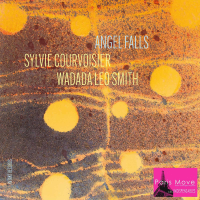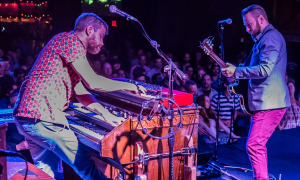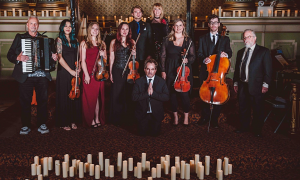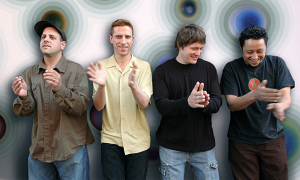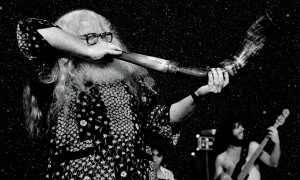Home » Jazz Articles » From the Inside Out » Pucho Brown: 'Soul Brother' Number One
Pucho Brown: 'Soul Brother' Number One
Ain't too many cats can get into that funk like we can get into the funk. Latin groups and jazz groups, they can do jazz, and they can do the Latin, but they can't do the funk like I can do it.
Pucho & The Latin Soul Brothers have been cold kicking Latin boogaloo like nobody's business for four decades now. The Hideout (Milestone), their new release, keeps rocking Brown's trademark beat-crazy mixture of pop, rock, soul, and ballads. "The Hideout was a bar at 113th Street and 8th Avenue," Brown explains. "It was booming for 35 years or so -from the '40s into the late '60s -and I used to play there as a kid. The new album is a tribute to the musicians who played there and the gangsters who hung out there."
The Hideout
Brown's long career consists of several phases. He recorded for Prestige Records in the 1960s, seven Latin Soul Brother albums seething with funky Latin jazz or Latin jazz-funk or whatever you choose to call it. Several featured extraordinary funk drummer Bernard "Pretty" Purdie and guitarist Billy Butler, and were arranged by keyboardist Neal Creque, who moved on from the Soul Brothers to work with Grant Green, Eddie "Cleanhead" Vinson, and Mongo Santamaria.Few people who heard these Prestige sides would doubt Brown's ability to cut a groove. But no one could have anticipated that, decades and thousands of miles across the Atlantic later, these albums would germinate into seeds of acid jazz. Pucho & The Latin Soul Brothers' music, in particular their raveup / beatdown of "Got Myself a Good Man" (originally recorded by Gladys Knight & The Pips), became the style of choice among London DJs in the mid-1990s. Moving to introduce Brown into a scene he did not even know he helped create, Prestige released the compilations Legends of Acid Jazz in 1996 and Cold Shoulder in 2000. As Brown opens the liner notes to Legends of Acid Jazz : "In the mid-Sixties, when soul music came out, we started playing Latin soul. It was a mixture of soul and jazz, like soul-jazz. Today the kids call it acid jazz."
"The kids" knew a good thing when they heard it, and their "acid jazz" helped launch this latest phase in Brown's career. He continues to resolutely lead his music forward, while also respecting its sources, and The Hideout is typical eclectic, electric Latin Soul Brothers. Guest vibraphonist Joe Locke adds sparkle to the title track, and liquidly tumbles into and out of the verses of a rousing "Superstition" (Stevie Wonder), where guest saxophonist Dave Ellis honks out gutbucket melodic reply. Latin compositions such as "El Albaniquito" (Tito Puente) and "Para Mongo," which Locke adorns in icy cool blue crystals, a facile cover of James Brown's "Born to Groove" that sounds just a little too slick, and the romantic ballad "Ruby," all sizzle in this same skillet, everything cooked with Latin hot sauce.
Like his music, Pucho Brown remains colorful, passionate, and just keeps rocking onward. "I've done some achievements in my life, and I ain't finished yet," he enthuses. "This album should do a lot because it's a hell of an album." This most soul-full of the Latin Soul Brothers spoke with AAJ upon the release of The Hideout.
Cold Shoulder
AAJ: Where did you get the name "Pucho"?HPB:The Pucho name came from a group in Cuba called Pucho & the Alfarona X. As a teenager I had a poster on the wall of Machito and Tito Puente -I think, or Tito Rodriguez -and Pucho & the Alfarona X. A friend of mine came up to the house, looked at it, he thought it was kind of funny, he laughed and said "I'm gonna call you 'Pucho' from now on."
Editor's Note: In May 2004, AAJ received the following eMail:
"My name is Louie Cruz. I don't know if you've heard of me but I played with Ray Barretto from 1967 thru 1974. I'm a pianist, arranger & composer of "salsa" music. I read your article on Mr. Henry "Pucho" Brown & just wanted to set the record straight. My father, LUIS CRUZ, was the founder of the band named "ALFARONA-X" in PUERTO RICO in 1941. The gentleman Mr. Brown refers to as "Pucho" was the lead trumpet. The original band consisted of 1 trumpet, 1 clarinet, tres player, bass, bongo,piano, 2 singers & my father on guitar & vocals. The clarinetist was Irene Caras' father. My father brought the band to NY in 1945 & it became very famous very quick. They played with Machito, Puente. Tito Rodriguez, Arsenio etc., etc. By then it had become a full fledged band with 3 trumpets. We moved back to Puerto Rico & my father left the group with the lead trumpet (Pucho Marquez). Just wanted to let Mr. Pucho that it wasn't a Cuban band."
AAJ: Is there any way you could spell that band name for me so that I don't screw it up?
HPB: No, I don't. (laughs)
AAJ: You play timbales on the new album. What other percussion do you play?
HPB: I play a little bongos and a little conga drums. Just very little.
AAJ: Help us out with that lyric about Mongo Santamaria in "Para Mongo"? It goes: "Mongo Santamaria/ The man from..." where?
HPB: Oh, Jesus Christ. That's the town that he came from. (Ed. Note: Upon further review, the complete lyric is, "Mongo Santamaria / The man from Jesu Maria.")
AAJ: And is that "Chano Pozo" being referred to in the lyric to "El Abaniquito"?
HPB: I really don't know. It's an old tune, it was recorded by Tito Puente in the early '50s, and I decided to record it.
AAJ: Why this James Brown song out of all of the ones available to choose from?
HPB: Well, the conga player in my group at that time, he worked with James Brown -Johnny Griggs -and he turned me on to a couple of tapes. This song was on one of the tapes and I liked it.
AAJ: Same question about Stevie Wonder: Why "Superstitious" and why on this record?
HPB: I don't know, I just picked it out, that's all.
AAJ: What's going on during that percussion break in "Superstition" that makes it sound so crazy and hot?
HPB: Rhythm. African rhythms. My music has a lot of rhythm in it, you know. I guess it's something that we just took out, you know, to make you feel good.
AAJ: One of the bass players is credited only as Harvie S. You couldn't use his full name?
HPB: That's Harvie Swartz. That's how he goes, by "Harvie S" now.
AAJ: Joe Locke also appeared on your previous album Mucho Pucho. What is it about the way Joe plays that most appeals to you? And what does he play on your new album that most appeals to you?
HPB: I like the way he plays but it's the producer, Todd Barkan. He picked him for the sessions. I like The Hideout and...I like all the things that he does. He's tasty and he puts it in the pocket.
AAJ: This is your first recording with Dave Ellis. What about his playing attracted you to invite him as a guest, and what does he play on your new record that most excites you?
HPB: That was also Todd. He played everything in the pocket, it was all right. I enjoyed it very much.
AAJ: Give us Pucho's one sentence self-review of his new record?
HPB: I think it's pretty hip.
AAJ: It seems that you and your groups really hit your stride working with Prestige Records. Any particular reasons why?
HPB: It was the times of the music, the Latin boogaloo days. The group was young, it was a young group at that time, and there were a lot of other groups whose music at that time were doing Latin boogaloo, groups like Willie Coló®¬ Johnny Colon, Joe Bataan?everybody was out there. But I guess I just had a different thing going on. Like I still have today. My group is a very hip group. Not too many groups could do musically what my group does.
That's still true today. I had a review from a gentleman in a Seattle newspaper. He said that Pucho's rhythms?not even Puente or Sanchez can touch the funky rhythms that he makes, something like that. I have it upstairs somewhere.
Like I say: Ain't too many cats can get into that funk like we can get into the funk. Latin groups and jazz groups, they can do jazz, and they can do the Latin, but they can't do the funk like I can do it.
Legends of Acid Jazz
AAJ: When record labels put together anthologies like Legends of Acid Jazz or Cold Shoulder, do you get pulled into the process at all?HPB: I had one I did, maybe Acid Jazz , but I did one, I put one together, and they put the rest together.
AAJ: Have you heard Cold Shoulder?"
HPB: I don't know. Maybe. Those were some of the things with Jackie Soul on it? Yeah, some things...like I said, we were very young in them days. Today, to listen to it, some things I like and some of the things I didn't like.
AAJ: One of the most compelling cuts on those anthologies is your version of Herbie Hancock's "Maiden Voyage" on Legends. It typifies what you just said: That your band can play jazz and Latin and funk, all in the same song.
HPB: "Cantaloupe Island," too, I think is one of my favorites of the Herbie Hancock things that we did. I like our version of "Cantaloupe Island," that was pretty good. And he liked it also.
AAJ: There's a huge gap in your discography between Super Freak released in 1972, and Rip a Dip and Jungle Strut, with Bernard Purdie and Melvin Sparks, both released in 1995. What were you doing during this period?
HPB: I was in the Catskill Mountains making money. Playing in Jewish resorts, working with stars like Milton Berle, Robert Goulet, Tony Bennett. That was the "matzo ball circuit" I was working.
AAJ: What happened in 1995 that led to your return to recording?
HPB: Well, in 1993 I left the hotels. I played the hotels up in the mountains from about 1974 to 1993, I believe. And then I left the hotels. Matter of fact, I got fired, okay? Put it that way. I was at one hotel for fourteen years, and we had a little discrepancy and so I left. I was out of work for a year. Got in touch with a lot of people, and they said, "Man, Latin jazz was very hot." And I said, "Man, these cats ain't doing nothing that I didn't do in the Sixties!"
I got in touch with people. They said, "Man, ain't nobody heard you," I had been off the scene for so long. I got in touch with Bob Porter of WBGO and he told me he just got back from London and that my records were all over London. Not knowing that I was very popular over in Europe, and didn't know it, on the acid jazz scene. That's the way I made my comeback, through a gentleman named Russ Newberry. He brought me over to London, and that was it! So it started my European career.
Jungle Strut
AAJ: The credits for Jungle Strut include guitarist Melvin Sparks and drummer Bernard Purdie. What makes "Pretty" Purdie such a funky drummer?HPB: Yeah, that's Bernard's style. I've known of him a long time, you know? Working with King Curtis and Aretha Franklin, who he worked with for many years. But there's another cat, Idris Muhammad, that's down with that just as well as Bernard, who can play the funk. Excellent, excellent jazz drummer, he's one of the finest jazz drummers around, but Idris can play that funk like nobody else can. Bernard, he's one of the best at it.
AAJ: You're also credited with working with King Curtis. Any of that ever make it onto record?
HPB: I recorded with him on "Pata Pata," that was for Atlantic Records. I recorded with him on some other stuff...I did two recordings with King. I was like his second band. When we played dances, back in the '60s, and he needed another band, he used to always hire me as his second band. So me and him were pretty tight. I think it was for Atlantic Records.
AAJ: You also did sessions with Gene Ammons?
HPB: I did one session with Gene on Prestige, when he came back on the scene. That was on Nat King Cole's tune, it was a calypso song (starts to sing a melody)...I forgot the name of it, but I got the album upstairs somewhere. (Ed. Note: "Calypso Blues" from Ammons' album "Night Lights.")
AAJ: You also have credits with Roberta Flack and George Benson?
HPB: George Benson, I did a couple of CDs with, yeah. We were always on sessions together, when he was with Jimmy Boyd as his manager, there was a flock of people who were in his stable. They used to always record, and I was one of the guys, like Lonnie Smith the organ player, he was part of the stable, George Benson, a couple of other cats there.
Rip a Dip
Roberta Flack, I did a recording for a commercial with her, an Eastern Airlines commercial. I just put that down in my credits, I never actually recorded with her, just did that one recording for an Eastern Airlines commercial.AAJ: What do you enjoy the most about playing percussion?
HPB: I don't know, I just?I guess the timbales was...seeing Tito Puente in my earlier days and, you know, I liked to be somewhat like him. Not like him, but, you know, he was my idol.
AAJ: What's the funniest or most exciting thing that you ever witnessed while you were on the road with a band? At The Hideout, for example?
HPB: The funniest thing that ever happened in the Hideout? When a cat came in and shot the goddamn place up. And people scrambling to get out of there. Now there was a lot of funny tales. And me and my man from a club up in New York City he owns now called Perks, me and him dived behind cars in the street. That's the kind of joint The Hideout was. It was a fabulous place but there was a lot of shootin' in it. A lot of funny things happening in there.
I got another story! I was on a train coming from Leeds over in England and there were a lot of people over there -like they got guns over here in America, they got knives over there in England. So we're pulling out on the train and we're pulling out and we're pulling out, and the train stops. So when the train stops, a policeman gets on the train, right, he's walking through the car. And he says, "Is anybody around here holding a knife?" They thought somebody had a knife on the train. And I'm the only black sitting on the train and he looks at me. So I hollered out, "Look at that -I'm the only black sitting here and he's looking at me!" And all the English are very reserved, and they all bust out laughing. I made everybody laugh on the train.
AAJ: Would you be okay with it if one of your grandchildren came to you and said they wanted to be a professional musician?
HPB: Yeah, if they could play. You would hear some kind of indication that they can play. That something. They could do a beat or something, and you could know if they got it or if they ain't got it. None of my kids had it, so I never pushed them.
AAJ: What is the biggest difference between the time you started as a professional musician to the time that young person might be starting today?
HPB: The gatekeepers. The guys who let you in, or who don't let you in. Today there's no respect in the business. You call people, they don't return your calls. They call you when they need you. They don't pay you no money. When I say "don't pay you no money," you get paid when you're working but then?it's not like years ago.
You used to do good years ago, you don't do good today. There's so many musicians out here today, the union ain't shit, there's guys that's working today for peanuts. When I say "peanuts," I mean they got people working for thirty-five dollars. You're talking about a professional musician. And there's so many musicians and everybody can't work, so that's why it's a cutthroat business. I've even heard that there's places where you've got to pay the club owners to do a jam session. Which is ridiculous. In my day, it was never like that.
I don't know?today, the music scene is, you should excuse me for saying, fucked up. The only cats who are making money in the music business -I'm saying in New York City -are on Broadway shows, the opera cats, and that's about it. A couple of guys, I guess they've got top of the line gigs, trio gigs or single gigs in swank hotels and whatnot. Then when the stars come in town, that's all the jazz clubs hire are stars. The Blue Note, Birdland, the Vanguard, they hire stars. All of the other cats that are playing, they don't get no work.
AAJ: Are you playing somewhere in New York these days?
HPB: Yeah, we're getting ready to go into Cecil's Jazz Club in October and then we're going into S.O.B.'s, then we're going into 6-6-6, a jazz club out in Brooklyn.
AAJ: Are you going to tour more broadly around the release of The Hideout?
HPB: If they set me up work, I'll tour. I'll do it. The record companies, they really don't do nothing for you today. A long time ago record companies used to do something for you. They don't do nothing for you today. Like I said, it's very hard, you got a manager?I'm a goldfish swimming with sharks.
I'll be 66 in November. I've been around, and I've been around . I've been all over the world. The Jungle Strut album was on a Japanese label, Lexington Records. The Japanese own that, they brought me to Japan for the record, and we did pretty good. I've been around. At this stage of my life, I can still make pretty good music.
When I listen to other cats, what they're laying down today, it's all right. It don't knock me out. I'm an old-timer. I like the mambo. All this salsa stuff, that's the new bag. It don't knock me out. All the things that the cats are playing are all right...
You don't have to do no benefit for me. I'm all right. I got a couple of dollars in my pocket. I got a couple of Cadillacs in the driveway. Got a swimming pool in my backyard. Got me a nice big home. So, I don't give a hell. I'm all right. And a lot of cats have been around and they don't have what I got.
I recorded well over twenty CDs in my lifetime. I was just saying, I'm probably one of the last cats who is still with Fantasy, with Prestige. I wanted to ask them, how many cats are they recording today who they recorded back in the sixties and are still recording with the Prestige company?
AAJ: Sonny Rollins is still with Milestone.
HPB: Okay. That's about it. Well, I'm in good company. You can put that down: I said that if Sonny Rollins is still recording for the company like I am, I'm in good company.
I made the International Latin Hall of Fame, last year or year before last. I'm the second black. I'm behind Dizzy Gillespie. Dizzy Gillespie was the first black. And there's a lot of cats that's in that, you know, and there's a lot of cats playing that music -he was the only black. I am only the second African-American to win the award. So that's an honor, behind him.
I've done some achievements in my life, and I ain't finished yet. This album should do a lot because it's a hell of an album.
AAJ: Do you remember the first time you went into a recording studio?
HPB: I guess so. The first time?the really first time? The really first time. Oh, God. I guess that was back when we did the demo record for "Darin's Mambo," when we went into the studio for that.
Tags
PREVIOUS / NEXT
Support All About Jazz
 All About Jazz has been a pillar of jazz since 1995, championing it as an art form and, more importantly, supporting the musicians who make it. Our enduring commitment has made "AAJ" one of the most culturally important websites of its kind, read by hundreds of thousands of fans, musicians and industry figures every month.
All About Jazz has been a pillar of jazz since 1995, championing it as an art form and, more importantly, supporting the musicians who make it. Our enduring commitment has made "AAJ" one of the most culturally important websites of its kind, read by hundreds of thousands of fans, musicians and industry figures every month.







